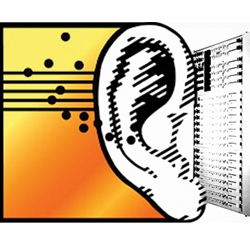Can you recognize the difference between a major chord, a minor chord, or a 7th chord? Can you identify a song’s chord progression without seeing the sheet music?
Skills of this type are great for musicians who sing or play an instrument, but can they help a sound mixer?
Mixing live and/or recorded sound requires a different set of critical listening skills – skills that are often acquired from many years of experience, by trial and error, or from being mentored. However, can these skills be learned more formally and effectively?
“Listen… Do you want to know a secret?” A lyric from a classic Beatles song, of course, but for audio professionals, perhaps this musical question is asking if we can hear the secrets of the music just by listening – secrets of proper balance, EQ correction, distortion removal, and others.
Do we understand how to really listen – “to discern, measure, analyze, and express the physical qualities of musical sounds accurately.” (Golden Ears User Guide, Dave Moulton, 1995)
Is Something There?
What secrets are we hearing but can’t identify? Compare this situation to the scene in the movie Charade, when Cary Grant dumps the contents of an airline bag on a bed, telling Audrey Hepburn, “I mean, it’s there. If only we could see it. We’re looking at it right now. Something on that bed is worth a quarter of a million dollars.”
How frustrating for them, and how frustrating for audio professionals to hear audio and know something is there, but lack the skills to discern it with their ears and identify what it is.
So many qualities of music are hiding right there in the open, but can we recognize them and make good mixing decisions based on our critical analysis?
Stephan Jenkins, producer, songwriter and vocalist of the band Third Eye Blind, offers his take. “As sound geeks, we can talk about this (how music is recorded and mixed), and think it doesn’t matter to other people. But it does matter; they just don’t know that it’s bothering them. They don’t know why it is that they don’t listen to that album anymore. I think it’s because there are little burrs and jags in the sound that are bothering (them).” (ArtistPro Magazine, Sept/Oct 2003)
I’ve been performing comedic impressions for most of my life. In order to do these impressions, I’ve had to listen critically to the characters in movies, on TV, to my teachers, professors, and many of my current colleagues and students. I really enjoy recreating these “voices’” for comedic effect to add humor and variety to my engineering lectures.
But how do I do this? How do I make my voice sound like that of another person? What goes on in the brain?
I usually see the person in my mind, performing distinctive actions and mannerisms, and I try to copy what I see in my mind. Then I hear with my mind’s ear what the visual image is saying, and copy that with my voice.
While I perform the vocal impression, I monitor what I’m saying to check if the impression is similar to my mind’s impression, and correct my voice parameters (timbre, pitch, inflection, etc.) to achieve better accuracy. Thus, in overview, I’m trying to create an accurate impression based upon my mind’s sensory observations.















